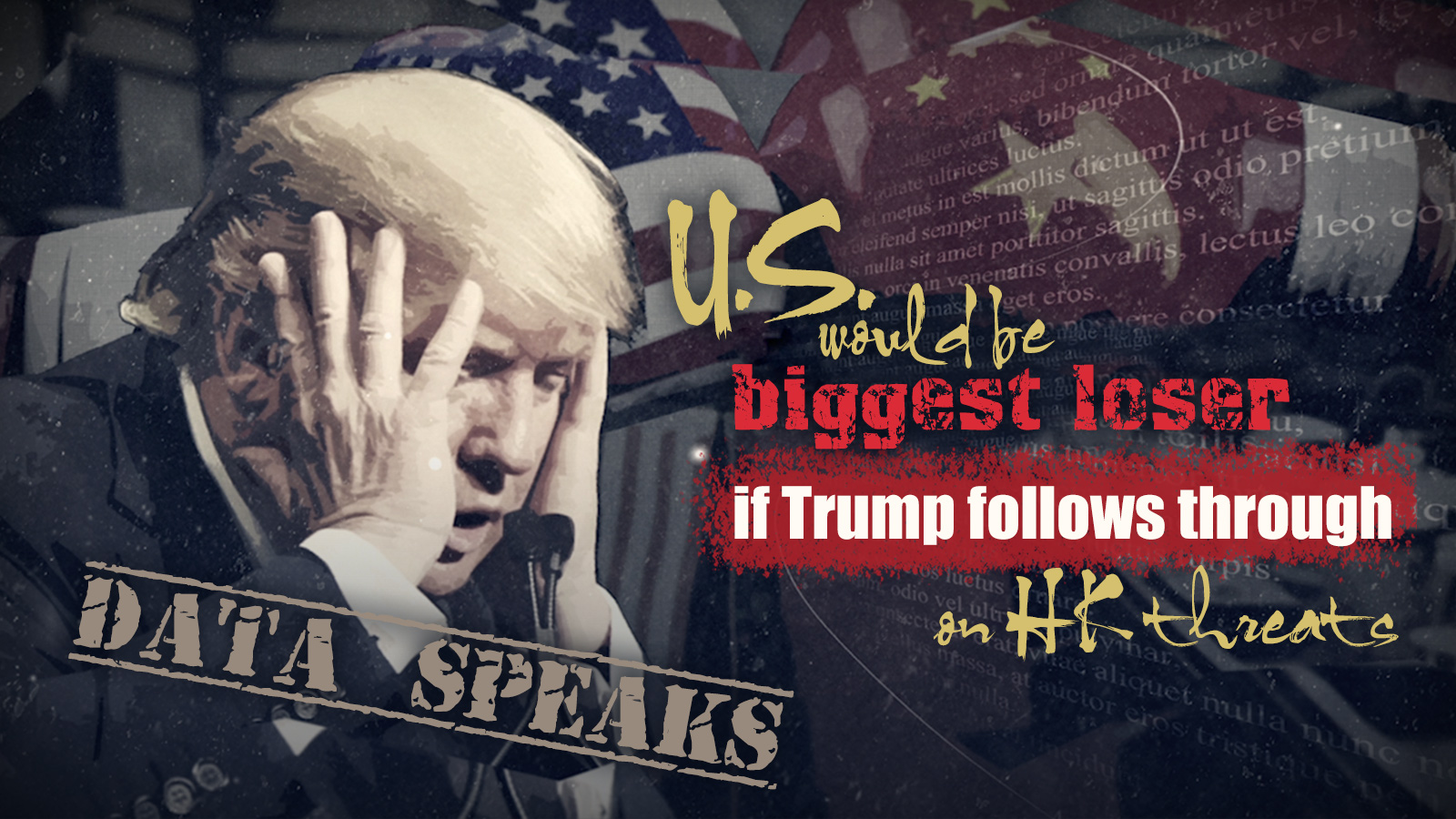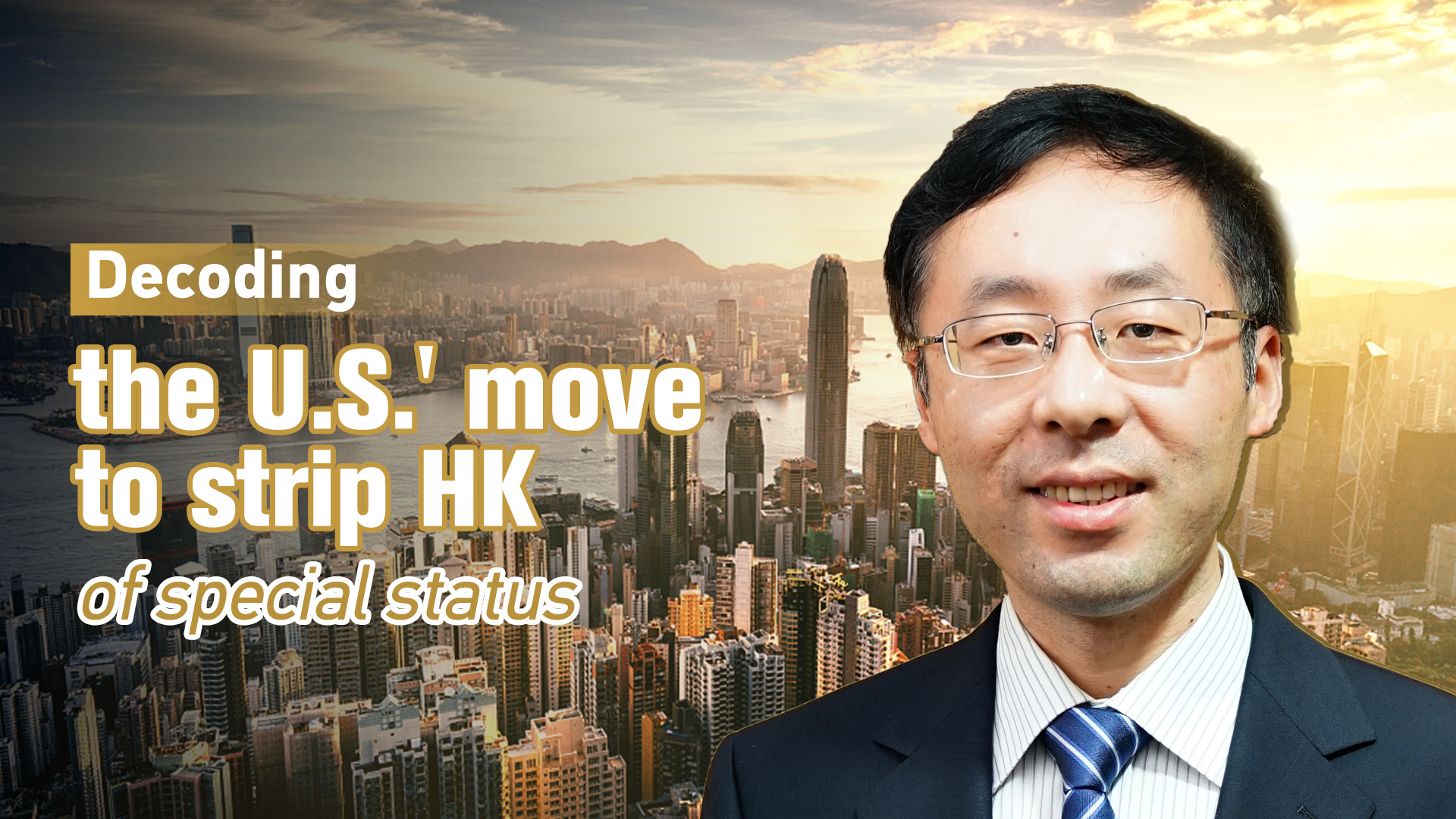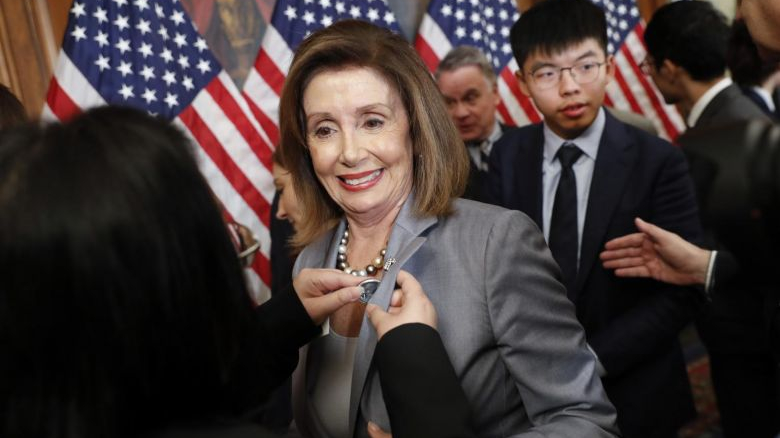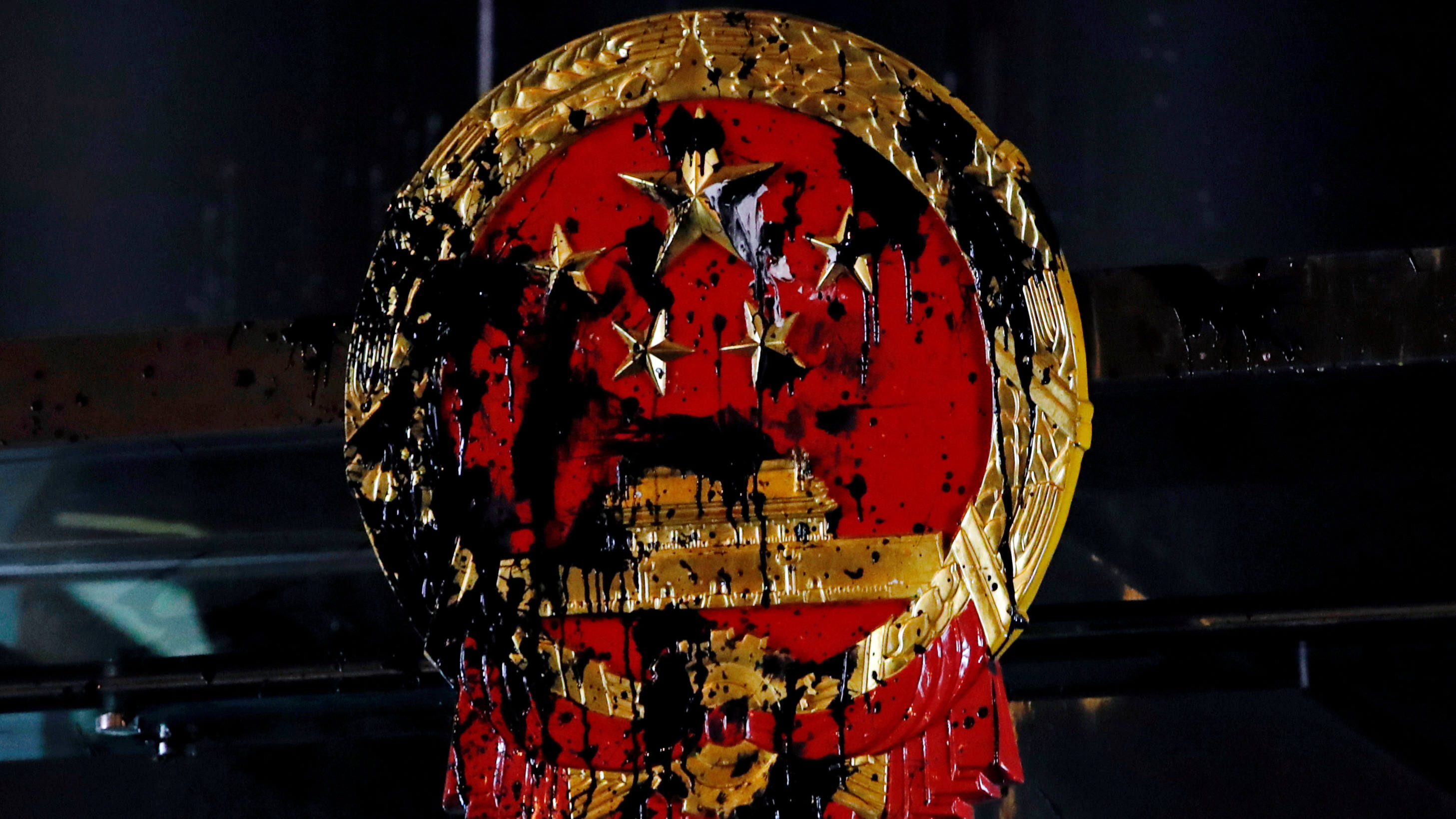03:45

When China signaled it would adopt a national security legislation for Hong Kong, U.S. President Donald Trump threatened to revoke HK's "preferential treatment as a separate customs and travel territory from the rest of China." A month later, after China passed the law, the Trump administration suspended exports of sensitive U.S. technology and defense equipment to HK as its first step of retaliation. Will the country go any further?
CGTN interviewed Wang Peng, a professor at the School of Economics in Jinan University, who is also the deputy director of the university's Hong Kong, Macao and Taiwan Economic Research Institute, to understand what is happening now and why.
The interview has been edited for clarity and conciseness.

Q1: Compared with the Chinese mainland, Hong Kong is a separate customs territory in WTO and it also enjoys special treatment under a U.S. law passed in 1992: the United States - Hong Kong Policy Act. What's the difference? Will U.S. sanctions alter HK's position of as a separate customs territory?
Answer: The two have essential differences. As a separate customs territory in the WTO, Hong Kong enjoys tariff reductions and exemptions, which has a certain overlap with the preferential trade policies granted by the U.S. under the 1992 act. Aside from special trade treatment, including rapid customs clearance, easy certification process for products exported from HK to the U.S., the act also grants HK a series of political and legal privileges, like an extradition treaty, free currency change and the export of sensitive technologies.
U.S. can cancel the privileges it gave to Hong Kong, but can't scrap HK's special status as a separate customs territory, because the status of being a separate customs territory is not granted by the U.S., but is recognized by all WTO members and confirmed by the Basic Law.
Editor explains: If the U.S. is determined to cancel Hong Kong's status as a separate customs territory, it needs to rally allies to convince them that HK no longer enjoys full autonomy in its foreign trade relations, which is a very complicated process and will trigger a new round of clashes with China within the WTO system.
Q2: U.S. President Donald Trump claims he will scrap Hong Kong of its special status, is this more political hype or he is really thinking about it? If the U.S. goes further, will EU countries follow suit?
Answer: This is a very dangerous signal. But in my opinion, it is unlikely that Trump will fully cancel its special treatment to HK, because the U.S. will suffer great losses. Losing Hong Kong, all the economic, military, political and diplomatic arrangements that U.S. has long implemented there, will be severely impaired or even abolished. It's devastating for the U.S.' Asia-Pacific strategy. So I think it's more possible that the U.S. will revoke part of HK's privileges but not fully.
Donald Trump is seeking a second term in the November presidential election. For now, seeking reelection is his top agenda. Since the outbreak of the pandemic, the U.S. has acted terribly in preventing and controlling the epidemic, which has caused relatively high pressure on the government. In this case, Trump is trying to shift public focus and China has become the major target of his blame-shifting.
In addition, European countries and Japan are less likely to follow in the U.S.' steps, because these countries have their own interests in HK. However, these countries may vocally support the U.S. because they are close allies and they may face pressure from the U.S.

Hong Kong media boss Jimmy Lai meets U.S. Vice President Mike Pence in the White House, July 8, 2019. /Reuters Photo
Hong Kong media boss Jimmy Lai meets U.S. Vice President Mike Pence in the White House, July 8, 2019. /Reuters Photo

House Speaker Nancy Pelosi is given a lapel pin by a Hong Kong activist in Washington, September 18, 2019. /AP Photo
House Speaker Nancy Pelosi is given a lapel pin by a Hong Kong activist in Washington, September 18, 2019. /AP Photo
Q3: If the U.S. revokes HK's special status, what are the impacts for the Chinese mainland and HK? Will it backfire?
Answer: Trump is very different from other U.S. presidents. If he does revoke HK's special status, the impacts for the Chinese mainland, HK and the U.S. are all severe. For example, though some cities in the Chinese mainland such as Beijing, Shanghai and Shenzhen have played some role of HK after 40 years of reform and opening-up, but HK is irreplaceable. It's a very international city and adapts to international standards, while the Chinese mainland has not yet reached such a degree of internationalization. And for HK, its function as a bridge linking the Chinese mainland and the outside world will be impaired.
However, for the U.S., the move will definitely backfire. If the U.S. strips HK of its special economic treatment, the tariffs on products imported from HK will be raised, and the higher price of these products will ultimately be paid by Americans. In addition, the U.S. has a lot of financial companies in HK, which has a relatively low threshold for listing and can tap global capital very quickly, attracting many Chinese mainland enterprises to list in HK. If the special treatment is removed, some Chinese mainland companies will choose not to list in HK, which will greatly shrink U.S. financial companies' businesses.
Data backup: According to HKSAR officials, HK has the largest U.S. trade surplus in the world and the U.S. has earned a cumulative trade surplus of nearly 300 billion U.S. dollars in HK over the past decade. HK is also the third largest importer of U.S. wine and the fourth largest market of beef products from the U.S.
According to the Chinese Foreign Ministry, the U.S. has 85,000 citizens, more than 1,300 enterprises, about 300 regional headquarters and 400 regional offices in HK, so any restrictions on HK will damage the interests of American companies there.
Q4: The national security law for HK only punishes serious national security crimes such as secession, subversion and terrorist activities. Why is the U.S. being so vigilant, threatening to revoke HK's special status?
Answer: Widespread protests broke out in HK last year. At its highest point, the protests became really violent. Some radicals stormed the Legislative Council building in HK and defaced the national flag and national emblem, which is far beyond the tolerance of the central government. Under this background, China passed the HK national security law, which shows that the central government has the capability to intervene in HK's affairs at key moments.
The law exasperated the U.S. as the country has a lot of interests in HK and has long been reluctant to allow the Chinese central government to intervene in HK. The U.S. began its activities there after WWII and as a free port, HK has become a stronghold for the U.S. in Asia. It has been distributing a large number of CIA personnel, political and diplomatic personnel in HK to carry out anti-central government and subversion activities.
The passage of the national security law will enable the central government to set up national security agencies and station personnel in HK to safeguard national security, which angered the U.S. very much because it worries the law will diminish its influence in HK and eventually impact its strategy in Asia. The country now is eager to change the situation and is trying to reverse the tide by imposing sanctions against HK. But this time the central government is determined to intervene in HK. Otherwise, the deep-rooted problems in HK can't be solved fundamentally.

Violent protesters stain Chinese national emblem at the Liaison Office of the Central People's Government in the HKSAR, July 21, 2019. /Reuters Photo
Violent protesters stain Chinese national emblem at the Liaison Office of the Central People's Government in the HKSAR, July 21, 2019. /Reuters Photo
Q5: The U.S. has been increasingly hostile to China in recent years. Is the move to scrap HK's special status an extension of the China-U.S. trade war and intensifying global competition between China and the U.S.?
Answer: Since the WWII, U.S. has long been the world's leading power and has been wary of China. But in recent years, the country suddenly realized that the gap between China and the U.S. is narrowing since China has made great progress in economic and technological fields. In this case, the U.S. views China as a potential threat. But this is prejudice. China never seeks hegemony and is not interested in racing for the world number one. But the U.S. doesn't see this. It views China as a threat, looking for any excuse to suppress China.
The U.S. sanctioned ZTE Corporation in 2018 and it was only the start. After ZTE, it increased tariffs against Chinese products, investigated Tik Tok and Huawei, and arrested Meng Wanzhou last year. Since the outbreak of HK's protests, U.S. officials have patently supported radical protesters and some activists’ efforts to separate HK from China, which further intensified the tension between the two countries. This time, the U.S. claims to have scrapped HK's special status. It can been seen as the extension of the trade war and heated competition between China and the U.S.
But, in terms of the long run, the relationship between China and the U.S. will return to the right track one day, despite some twists and turns along the way.